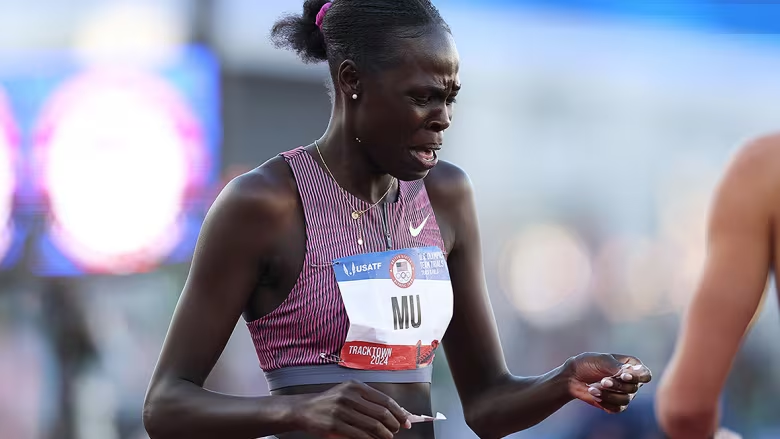Naomi Osaka, the tennis champion, talks about her struggles after giving birth to her daughter, her role as the face of a new campaign to pass paid leave, and why she is beyond worrying about what other people think of her as she makes her first appearance back at the Australian Open since then.
Naomi Osaka is accustomed to having her motions captured, whether it’s during her training sessions, which she records and frequently posts on social media, her matches, or press interviews. She is a four-time Grand Slam champion, a former world number one in tennis, and among the most paid women in sports.
One of the things she hadn’t entirely expected was the arrival of her daughter Shai in July 2023. Nevertheless, as Naomi recalls, Osaka’s mother voice-recorded her delivery, recording “the moment Shai came into the world.” It was an unexpected, but pleasant, keepsake.
Even Osaka, who is renowned for her privacy, would find it an intimate story to convey. However, it provides a glimpse inside her world: Family comes first, despite the enormity of her professional accomplishments, the awards she has received, and the companies she currently leads (the skin care line Kinlò, the creative media company Hana Kuma, and the talent agency Evolve). Three generations of Osaka women stood side by side to commemorate the birth of Shai.
Osaka claims that becoming a mother has drastically changed her. It was painful—both during her pregnancy and the postpartum period. Indeed, she now prioritizes something else in her day-to-day activities: “My world turned into a completely different world in one night.” She had to retrain herself, and she acknowledges this: “I can put my foot down a lot more now.” However, Naomi recovered and rebuilt herself (“it was a really long process”), and when she emerged, she was stronger and more complete than before.
“I simply don’t give a damn about what other people think anymore.”
“I feel so powerful,” she declares. People discuss childbirth, but until you actually go through it, it’s not the same. Simply said, I feel like I can accomplish anything and nothing will bother me, and as a result, my pain threshold has undoubtedly grown significantly. I simply don’t give a damn about what other people think anymore.
It feels like Osaka has superpowers when she talks about the enormous impact that becoming a parent has had on her. In her world, women are resilient and stronger due to the hardships they have overcome. They don’t fit any of the unfavorable preconceptions that occasionally accompany new mothers or women in the workforce. They can be a world-class champion while placing a child at the center of their existence.
Osaka is going to test that notion soon. She won the Australian Open in 2019 and 2021; she will make her comeback to the tournament on January 14. And on January 1st, after returning from maternity leave, she won her first top tennis match to start the New Year. The legendary tennis player is unfazed even though she lost her second match.
On January 1, 2024, Naomi Osaka attended the Brisbane International on the eve of her first postpartum match.
After her loss, she stated in an interview, “I need to enjoy these moments because I’ve trained so hard since giving birth.” “I’m depressed, but the depressive part of me is thinking, ‘Oh, I wish I could have done better. I know I’m going to be apart from her [Shai] for a long time, so I want it to be worthwhile somehow.'”
For Osaka, this newfound self-assurance and maybe even contentment both on and off the court is a significant change. It’s no secret that she has struggled with serious mental health issues throughout the years.She said in 2021 that she had experienced “long bouts of depression since the US Open in 2018” and that her introversion and fear about public speaking had made it difficult for her to do interviews. However, not much is off-limits these days. When I somewhat hesitantly ask about her experiences with postpartum, she says, “I’m pretty open,” then goes on to say how horrified she was to hear that “having a baby completely destroys your pelvic floor.” She also admits that she has changed, that she has discovered her voice, even though it is still eerily quiet but becoming more and more focused.
It’s strange, she thinks, because I’ve spent the most of my life, I guess, listening to my parents or constantly feeling under pressure to make them or other people proud. “And I’m not sure when it happened, but I suddenly felt the need to take care of myself. It’s a maturing experience. Even between this year and previous, I feel like a totally different person. I’ve had to learn throughout the years to just find my voice, understand what I want to stand for, and identify the things that are essential to me.
Osaka is advocating for new parents in 2024. More precisely, she is advocating for the repeal of paid family and medical leave in America in a new ad campaign for the infant formula company Bobbie. Only six nations worldwide lack a national paid parental leave legislation, including the US, where 73% of workers do not receive paid time off, and 25% of new mothers have returned to work less than two weeks after giving birth as a result.Together, Glamour and Paid Leave for All are pleading with Congress to approve it, and Bobbie’s advertising campaign is endorsing our petition. In addition, Osaka and Bobbie are pushing for federal paid leave while presenting 50 financial awards for 50 families to offer short-term assistance.
Osaka tells me, “I was really shocked when I heard the stats.” “Although I’m fortunate enough not to have to start work right away, I really wanted that time to comprehend everything that had happened and, of course, spend time with my new kid. It is also quite depressing to observe how many women are forced to work right away without having that option.
Osaka is fully conscious of her privilege in terms of decision-making. She decided not to breastfeed Shai, for instance. She remembers, “I saw Serena pumping before she went onto the court to play a match when I watched her documentary.” “I was considering whether or not this was the right path for me.” (She began using the Bobbie formula brand to feed her daughter, so her partnership with the company “came about organically.”).
Secondly, her decision to resume training fifteen days following childbirth. She did not think it was effective because she was not returning to the demanding elite tennis circuit; rather, her training was a continuation of a physical regimen she had followed for almost 20 years. Nevertheless, she faced criticism from all sides. “To be honest, I had no idea that people would make such a big deal out of my training so soon,” she adds. Since I’ve been physically training since I was seven years old, I find it strange. Thus, it feels quite natural to me.”
Ultimately, ignoring the naysayers and expressing a lack of concern for others’ opinions may have been her most important decision of all. Osaka says that’s what parenthood has given her. Moms are expected to be all-knowing and all-powerful. However, I’ve discovered that I’m far more capable of standing my own today, and I now understand why so many mothers have strong personalities and are noisy.”Samba
Still, her postpartum was challenging. And while she did return to training early, it was also necessary. We discuss about an elephant in the room, a subject that may often be terribly embarrassing to address, but which Osaka is refreshingly frank about: what happens to women and their pelvic floors postbirth. Yes, even four-time Grand Slam tennis champions.
“Having a baby completely destroys your pelvic floor,” Osaka adds. “I was shocked, because I couldn’t get up out of my bed. I had to roll sideways, and it was a pretty long process because, for me, my immediate way of thinking is: To rebuild this I have to do a lot of sit-ups. And I discovered that’s absolutely not how things should be done. You should engage in deep pelvic floor exercises.
“I did have a really great team around me that gave me a lot of information,” she says. “I feel like that’s something that not a lot of people have access to,” she says, though.
“I had the impression that I was entering the unknown.”
I wonder whether she was nervous when she started her pregnancy—not just about giving birth, but also about her career—given where she is now and all the knowledge she has gained about her body, her recuperation, and taking care of a newborn. After all, Olympian Allyson Felix disclosed less than five years ago that Nike, her previous sponsor, intended to pay her 70% less when she wanted to combine her profession with establishing a family. (Nike announced a new maternity policy for their sponsored athletes in response to the public criticism.)
“I was really anxious,” Osaka acknowledges. In addition to feeling like I was entering uncharted territory, I also thought that the final few years of my career had been somewhat inconsistent. I was thus unsure of my sponsors’ willingness to invest the time and effort necessary to accompany me through this. However, I’m incredibly grateful that I’ve surrounded myself with individuals who get me and that we’re embarking on this journey together. Although Nike is undoubtedly the largest issue in the room, they have been incredibly supportive.
A heartwarming complete cycle occurred when Felix, whose vocal testimony helped other sporty moms, was called for “random checkups because she knew what I was going through” by Osaka when she was on maternity leave. Being taken into consideration felt extremely good.
Naomi Osaka the tennis champion and Naomi Osaka the mother are the two personas she’ll be assuming as she gets ready to take the court in Melbourne in a few days to attempt to win back an Australian Open championship. She’s still having trouble adjusting to this shift. “When I walk on the court, it seems so different from being a mom,” she remarks. “Since I was three years old, I have played tennis, so for me, it is just as natural as breathing.” However, at the same time, I acknowledge that Shai is my daughter and that I don’t always worry about whether I’m a good mom. I just want to be a good role model for her and make her proud of me; there’s nothing I could or would want to do to change that.





